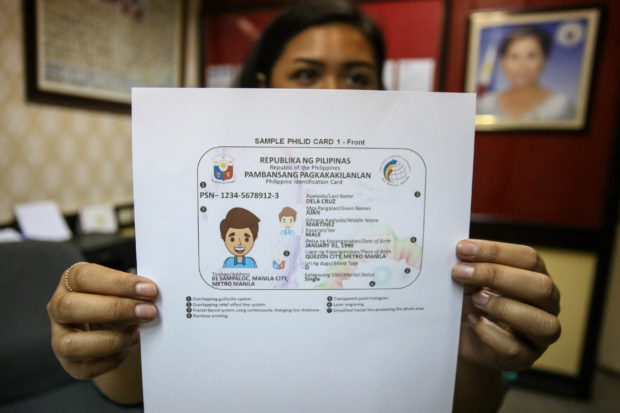
ID SAMPLE A Philippine Statistics Authority employee presents at the House a sample of the ID to be issued under the national ID system. —JAM STA. ROSA
Updated @ 1:42 a.m., Aug. 9, 2018
Applying for a national ID is not mandatory, but Filipinos who opt not to get one will face inconvenience in government and business transactions, the head of the agency that will manage the national ID system said on Wednesday.
“No one will be forced to enroll in the national ID system,” Lisa Grace Bersales, national statistician and civil registrar general, said on Wednesday.
The head of the Philippine Statistics Authority (PSA) said the national ID would be a requirement for doing business.
“It’s really more about accessing benefits. But if they don’t want to access benefits from government, then they will not really need to have an ID,” she said at a press briefing in Malacañang.
The Philippine Identification System (PhilSys) Act, which President Duterte signed on Aug. 6, provides for a single national identification system called “Phil ID,” which collates citizens’ data in a centralized database.
Under the law, the PSA will store a citizen’s common reference number, biometrics, voter’s ID, Philippine passport number, taxpayer’s identification number, PhilHealth number, Professional Regulation ID number, driver’s license number and other information.
Privacy concerns
Critics are raising fears that the national ID poses risks to the privacy and data security of Filipinos.
While she acknowledged such fears, Bersales assured the public that the privacy of ID holders would be protected.
“It is very explicit in the law as to how we will use the data, manage the data,” she said, noting that information will be shared only if the Phil ID holder or the court would allow it.
Despite warnings from critics, the national ID system has popular support.
Filipinos support ID
Seven out of 10 adult Filipinos favor it, according to Social Weather Stations (SWS).
Results of a survey the opinion agency conducted from June 27 to 30 showed that 73 percent of respondents approved of the then proposal to make a single ID for the different identification cards currently used by Filipinos.
Eighteen percent disapproved of the proposal, resulting in a net agreement score (percent agree minus percent disagree) of +55 that SWS described as “extremely strong.”
The noncommissioned survey covered 1,200 respondents and had a margin of error of plus or minus 3 percentage points.
Asked if the government could be trusted to protect private information contained in the national ID, 61 percent agreed while 8 percent disagreed. Thirty percent were undecided.
The survey also found that 49 percent had “much trust” the government would not use the national ID system against those who oppose it, while 13 percent had “little trust.” Thirty-nine percent were undecided.
Consent, court order
Bersales expressed elation over the poll results, saying the national ID system “will only answer who are you and who you really say you are.”
She said the law provided that the PSA could share its data to another party only if it had the consent of the citizen and if a court ordered it.
The database of the national ID will include 11 demographic questions, such as name, birthday, birthplace, sex, blood type and address, and one’s biometrics.
She said newborns would be enrolled in the system.
Every person will get a 13-digit number and the information can be updated in a registration center.
“Eventually, you don’t need the ID card. Just memorize your number. Just go to the government agency that you need to transact with and they will capture two fingers to authenticate who you really are,” Bersales said.
The national ID will cover 33 government agencies, she said. “The vision is, after four years, there is really no need for these (33) cards.”
P2.2-B budget
To implement the system in the next four years, the government will need P30 billion. The first national ID will be free of charge.
The PSA is working on the P2.2-billion funding that Congress has allocated this year for the national ID system.
A pilot of the ID system will be launched later this year, a mass rollout in early 2019, and a target enrollment of 25 million Filipinos every year, said Assistant Finance Secretary Tony Lambino.
For this year, Lambino said the government would prioritize the enrollment of 1 million people benefiting from its unconditional cash transfer (UCT) program. Another 1.6 million getting UCT will be enrolled next year. /cbb /pdi